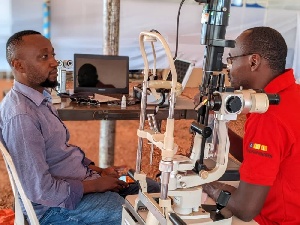Business News of Monday, 7 April 2025
Source: www.ghanawebbers.com
Iron sharpens iron: Building effective relationships and networks

This idea suggests that people can enhance each other through encounters and challenges.
Relationships and mutual progress are important. Activities like mentoring, discussions, and constructive criticism help individuals grow.
Being around positive people sharpens thinking. A meeting of minds helps refine thoughts into creative ideas.
To achieve this, you need partners who encourage critical thinking. Friends can pool their thoughts to improve each other’s skills in communication and teamwork.
In this article, I discuss networking, its importance, and how to benefit from it. Networking involves establishing and maintaining relationships with others.
Everyone networks when they know someone in their circle. We meet new people daily, forming alliances.
Networking occurs in schools, workplaces, religious institutions, and gatherings. Finding the right connections can be challenging but is essential for success.
The term "networking" means making and keeping connections with others. Strong relationships are invaluable; money can't buy them.
Good networking makes it easier to maintain these connections. By expanding one’s network, individuals can create meaningful relationships that support their career goals (Indeed Editorial Team, 2025).
Jackson (2025), a best-selling author, states that a diverse professional network is crucial today. It helps whether seeking jobs or industry knowledge.
According to Harvard Business Review (2023), strong networks lead to higher salaries and more opportunities for career growth.
Studies show that workers using five or more social media sites have better sales than those using fewer (Meister, 2013).
LinkedIn serves many purposes beyond hosting resumes (Davis et al., 2020). It is now a key tool for job seekers to connect with others.
Recent surveys indicate that 92% of recruiters use social media for hiring (Davis et al., 2020).
Fu and Ali (2024) note that social media boosts employee engagement through two-way communication.
Networking is vital for building a successful career by connecting with professionals in your field. It opens doors to new opportunities and valuable advice (Indeed Editorial Team, 2025).
Friendships formed through networking can lead to job offers as well. A business network consists of individuals connected by shared interests and experiences.
You can meet new contacts at conventions, workshops, seminars, business lunches, or similar events—both within current or past employers.
Online courses or seminars also provide chances to expand your network through alumni associations or professional gatherings.
Most of my personal contacts come from events I've attended; many professional contacts are from groups I belong to.
Building your professional network is essential if you want job opportunities or career growth. Your network includes acquaintances from various settings like social events or school connections.
Significance and Advantages
Establishing connections inside and outside your organization enhances emotional intelligence. Networking introduces you to potential clients or mentors in your field.
Mentoring builds professional networks between experienced leaders and less seasoned individuals (Dickson et al., 2014). It fosters healthy relationships while shaping company culture significantly.
Networking also leads to accumulating social capital—gains from interpersonal trust and teamwork. This becomes especially useful as careers develop based on trust-based connections.
Trustworthy partnerships yield more job opportunities, faster progression, innovation potential, higher status, and power (Casaciero et al., 2016).
Maintaining significant contacts requires a broad developmental network beyond just client connections. Networking allows learning from others' experiences while gaining referrals for your firm’s benefits too.
Methods for Constructing Efficient Networks
Here are some recommendations for creating effective networks:
1. Compile a list of everyone in your network: family members, friends,
coworkers,
classmates,
church members,
even casual acquaintances.
2. Communicate actively with your existing network by participating in relevant groups
such as neighborhood associations or alumni organizations.
3. Be clear about what you want from each connection before reaching out.
4. Improve communication skills: listen better,
recognize non-verbal cues,
manage stress,
become socially aware.
5. Build genuine relationships by being truthful,
caring,
expressing gratitude.
6. When asking for advice,
be explicit about what you need.
7. Rank your connections based on strength
while prioritizing maintenance efforts.
8.Set aside time for important contacts
while figuring out how to reciprocate kindness
effectively.
Danger Zones
While networking has many benefits,
there are pitfalls to avoid:
1.Avoid asking too much of new connections without offering help first.
2.Don’t dominate conversations; allow others space
to share their viewpoints too.
3.Be cautious not to appear overly wary
in unfamiliar settings which may hinder interactions.
4.Follow up after leaving networking events;
neglecting this step could weaken ties.
5.Always remain polite; communicate respectfully online
or offline by saying please
and thank you.
Bottom Line
Quality matters more than quantity when it comes
to effective networking according
to the Vorecol Editorial Team (2024).
The Bible emphasizes the importance of relationships
and community in successful networking too.
Hebrews 10:24-25 highlights believers gathering regularly
for support while Ecclesiastes 4:9-12 states “Two are better than one.”
Cooperation strengthens bonds necessary for overcoming obstacles together—essentially true even within networking contexts!
Takeaway
Proverbs 27:17 says “As iron sharpens iron,” highlighting how surrounding yourself with supportive individuals fosters growth through collaboration!
This article stresses the importance of helping others build honest empathetic respectful meaningful connections leading towards collective success!










